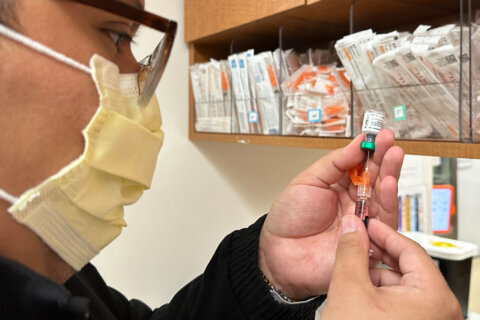Maryland first lady Dawn Moore recently revealed something very personal to the world. For more than 20 years, she has lived with multiple sclerosis or MS.
Her announcement comes during Multiple Sclerosis Awareness Month, and she said she is opening up about it to do just that — raise awareness.
MS is a neurological condition in which your body’s immune system, at times, will attack the myelin that protects a person’s nerves. That protective layer for the nerves comes under fire during what is known as “attacks” or “exacerbations.”
What’s unique about MS is that symptoms can vary widely. Some of the first noticeable symptoms are vision issues, weakness, numbness, coordination problems and even bladder issues. Multiple Sclerosis can even affect a person’s mood, according to Dr. Robert Shin, a neurologist at MedStar Georgetown University Hospital.
When the body attacks the protective layer around the nerves, it leaves damage that the body cannot heal. So, the nerve communication issues caused by that damage results in symptoms, some of which come and go, while others are continuous.
The symptoms that lead to a diagnosis can be scary. For some, blurry vision or even sudden loss of vision in one eye or both can lead to a diagnosis. For others, dizziness and vertigo lead to the discovery.
Since it can show up in so many ways, anyone with unexplained symptoms that last more than 24-hours should go to a doctor and get checked out.
“It really causes all kinds of different neurological symptoms and is actually more common than I think a lot of people realize,” Shin said.
There are several disease courses for MS, which includes relapsing-remitting which is the most common where after an attacks are followed by periods of partial or complete recovery, or remission. With progressive and secondary-progressive MS, symptoms gradually get worse, overtime.
According to the National MS Society, it is believed 1 million Americans have the illness.
“I also want to emphasize that multiple sclerosis can really affect almost anyone. It doesn’t matter if you’re Black or white, or a man or a woman,” Shin said.
However, it does appear to affect women more often than men, and people typically find out they have it between the ages of 20 and 50 years old.
Getting a diagnosis requires testing, with one of the most common ways being MRI scans of a person’s spine and brain.
While the diagnosis can feel like a gut punch for anyone diagnosed with it, Shin said, unlike getting the diagnosis in the 1970s and 1980s, now there are a lot more options for treating the illness, including dozens of therapies. Also unlike decades ago, a diagnosis today doesn’t mean a person will wind up in a wheelchair down the road because of MS.
Shin said with current MS drugs available, many people wouldn’t be able to tell by looking at someone that they have the disease.
The treatments are just that though, as currently, there is no cure for MS nor is there a treatment to fix the damage done during an attack.
Like Dawn Moore, other well-known people have also chosen to share their stories, among them actresses Christina Applegate, Selma Blair and Jamie-Lynn Sigler. Frontman for the ’90s band Everclear Art Alexakis also has it, telling the “Mastering MS Podcast” that he only found out after getting checked out after a car crash.
MS also hit close to home for this reporter, who was diagnosed in 2016 — my former colleague Dave Johnson, who has moved on from his sports director role at WTOP, received his diagnosis in 2019.
On Dawn Moore’s decision to speak about her MS journey, Chartese Berry, president of the Greater DC-Maryland Chapter of the National MS Society, said people telling their stories can help others taking on the disease — a disease that can feel isolating to some people.
“When you see someone say, ‘I’m living with this disease,’ and whatever that means to them, whatever their journey looks like, whatever the diagnosis looks like, it helps to educate others who are living with the disease. And it might shed a light on how they can process their diagnosis or what they might be able to do or how different things can help them in their journey,” Berry said.
Increasing awareness of MS is also helping to spur new studies into more therapies for the disease.
Berry said the organization is funding research at Georgetown University, which is looking into ways to repair the damage done during an MS attack. Advancements there would be an “amazing breakthrough,” Barry said.
Editor’s note: Neurologist Dr. Robert Shin is WTOP’s Mike Murillo’s doctor. Murillo, who was diagnosed with MS in 2016, is the co-host of the “Mastering MS Podcast,” which talks to people with the illness about their MS journeys.








